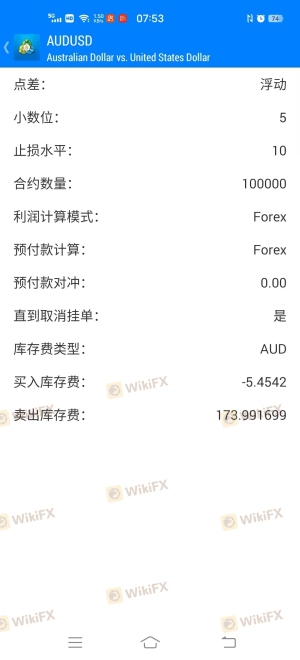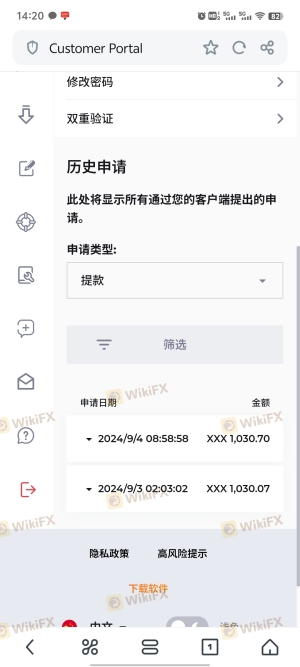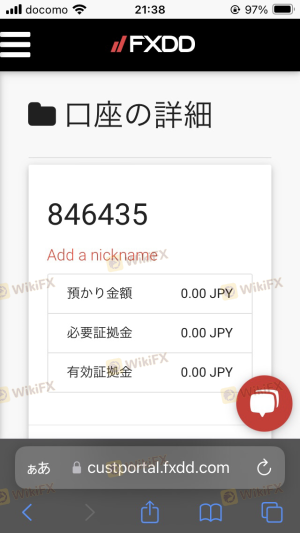Regarding the legitimacy of FXDD forex brokers, it provides MFSA and WikiBit, (also has a graphic survey regarding security).
Is FXDD safe?

Pros
Cons
Is FXDD markets regulated?
The regulatory license is the strongest proof.
MFSA Market Making License (MM)
Malta Financial Services Authority
Malta Financial Services Authority
Current Status:
UnverifiedLicense Type:
Market Making License (MM)
Licensed Entity:
TRITON CAPITAL MARKETS LTD
Effective Date: Change Record
2010-02-08Email Address of Licensed Institution:
--Sharing Status:
No SharingWebsite of Licensed Institution:
www.fxneo.comExpiration Time:
--Address of Licensed Institution:
TRIDENT PARK, NOTABILE GARDENS, NO. 6 & 7 - LEVEL 4, MDINA ROAD, ZONE 2 CENTRAL BUSINESS DISTRICT BIRKIRKARA Malta CBD 2010Phone Number of Licensed Institution:
--Licensed Institution Certified Documents:


Is FXDD A Scam?
Introduction
FXDD, established in 2002, is a global forex and CFD broker based in Malta, offering a range of trading services and instruments, including forex pairs, commodities, indices, stocks, and cryptocurrencies. As a player in the highly competitive forex market, FXDD aims to provide traders with innovative trading solutions and a user-friendly experience. However, the forex trading landscape is fraught with risks, making it crucial for traders to carefully evaluate brokers before committing their funds. This article aims to scrutinize FXDD's credibility through a structured assessment of its regulatory status, company background, trading conditions, customer fund security, client experiences, and overall risk profile.
Regulatory and Legitimacy
FXDD operates under the supervision of two regulatory authorities, the Malta Financial Services Authority (MFSA) and the Financial Services Commission (FSC) of Mauritius. Regulatory oversight is vital for ensuring that brokers adhere to strict financial standards, providing traders with a layer of protection against fraud and mismanagement. Below is a summary of FXDD's regulatory information:
| Regulator | License Number | Regulatory Region | Verification Status |
|---|---|---|---|
| MFSA | IS/48817 | Malta | Verified |
| FSC | C117017252 | Mauritius | Verified |
The MFSA is classified as a tier-2 regulator, which implies a moderate level of oversight compared to tier-1 regulators like the FCA or ASIC. This tier indicates that while FXDD is subject to regulatory scrutiny, the protections offered may not be as robust as those provided by higher-tier regulators. The FSC, on the other hand, is considered a tier-3 regulator, which generally has less stringent requirements and oversight mechanisms.
Historically, FXDD has faced scrutiny for its regulatory compliance. There have been reports of fines related to slippage and other operational practices, raising questions about its adherence to ethical trading standards. Nonetheless, the presence of negative balance protection and segregated accounts for client funds demonstrates a commitment to safeguarding traders investments. Overall, while FXDD is regulated, potential clients should weigh the implications of its tier-2 and tier-3 regulatory status against their trading needs.
Company Background Investigation
FXDD has a long-standing history in the forex market, having been founded in 2002. The company operates under the ownership of Triton Capital Markets Ltd., which is regulated by the MFSA. The management team comprises seasoned professionals with extensive experience in the financial services industry, contributing to the broker's operational expertise. However, the company is not publicly traded, which limits the level of transparency typically associated with publicly listed firms.
The firm has evolved considerably since its inception, expanding its service offerings and geographical reach. FXDD claims to have serviced over 400,000 clients globally, a testament to its operational capacity. Despite its growth, transparency regarding its ownership structure and internal operations remains somewhat limited. Information about the management team is not readily available, which could be a concern for potential investors seeking to understand the broker's governance.
FXDDs website provides information about its services and trading conditions, but it lacks comprehensive details about its corporate governance and operational policies. This lack of transparency may raise red flags for traders who prioritize understanding the entities they are dealing with. In summary, while FXDD has a solid operational history, the opacity surrounding its management and corporate structure may warrant further investigation by prospective clients.
Trading Conditions Analysis
FXDD offers two primary account types: a standard account and an ECN account. The standard account operates on a spread-only basis, while the ECN account provides access to raw spreads with a commission structure. Below is a comparison of FXDD's trading costs against industry averages:
| Fee Type | FXDD | Industry Average |
|---|---|---|
| Major Currency Pair Spread | 1.9 pips (EUR/USD) | 1.0 pips |
| Commission Model | $2.99 per lot (ECN) | $2.50 per lot |
| Overnight Interest Range | Varies by position | Varies by position |
FXDD's spreads are generally higher than the industry average, particularly for the standard account, which may deter cost-conscious traders. The ECN account offers more competitive spreads but introduces commission fees, which can add to the overall trading costs. Moreover, FXDD imposes an inactivity fee of $30 after three months of no trading activity, which is relatively high compared to other brokers.
The broker does not charge deposit fees, which is favorable for traders looking to minimize costs. However, withdrawal fees can apply, particularly for amounts below $100, which may impact traders who frequently withdraw smaller amounts. Overall, while FXDD provides a range of trading instruments and account types, its fee structure may not be the most competitive in the market.
Customer Fund Security
FXDD employs several measures to ensure the security of client funds. Client deposits are held in segregated accounts, meaning that they are kept separate from the broker's operational funds. This practice is crucial for protecting traders' investments in the event of financial difficulties faced by the broker. Additionally, FXDD offers negative balance protection, which ensures that clients cannot lose more than their deposited amount.
Despite these security measures, FXDD has faced historical scrutiny regarding fund security. There have been instances of client complaints related to withdrawal delays and issues, which raises concerns about the broker's operational reliability. The existence of an investor compensation fund under the MFSA provides some additional security, allowing clients to claim compensation in case of broker insolvency, but the absence of such a fund under the FSC is a drawback.
In summary, while FXDD has implemented several protective measures for client funds, potential clients should remain vigilant and consider the broker's historical performance in fund security alongside its current practices.
Customer Experience and Complaints
Client feedback regarding FXDD has been mixed, with many users expressing dissatisfaction with various aspects of the service. Common complaints include withdrawal delays, high spreads, and the responsiveness of customer support. Below is a summary of the main complaint types and their severity:
| Complaint Type | Severity Level | Company Response |
|---|---|---|
| Withdrawal Delays | High | Slow response |
| High Spreads | Medium | Standard reply |
| Customer Support Issues | Medium | Inconsistent |
Several users have reported significant delays in processing withdrawal requests, with some clients stating that they were unable to access their funds for extended periods. This pattern of complaints raises concerns about FXDD's operational efficiency and customer service quality.
For instance, one trader reported that after submitting a withdrawal request, they faced numerous hurdles, including requests for additional documentation and prolonged waiting times. This experience highlights the importance of reliable customer support and efficient withdrawal processes in maintaining trader trust.
Platform and Trade Execution
FXDD provides access to popular trading platforms, including MetaTrader 4 (MT4) and MetaTrader 5 (MT5), alongside its proprietary web trading platform. These platforms are known for their user-friendly interfaces and comprehensive features, catering to both novice and experienced traders. However, there have been reports of execution issues, including slippage and order rejections.
Traders have expressed concerns regarding the quality of order execution, particularly during high volatility periods. Instances of significant slippage have been reported, where the executed price deviated substantially from the expected price. This could indicate potential platform manipulation or inefficiencies in trade execution.
In conclusion, while FXDD offers robust trading platforms, the execution quality and reliability during volatile market conditions are critical areas that traders should scrutinize.
Risk Assessment
Engaging with FXDD involves a range of risks that traders must consider. Below is a risk assessment summary:
| Risk Category | Risk Level (Low/Medium/High) | Brief Explanation |
|---|---|---|
| Regulatory Risk | Medium | Tier-2 and Tier-3 regulation may not provide the highest level of protection. |
| Withdrawal Risk | High | Historical complaints about withdrawal delays raise concerns. |
| Trading Cost Risk | Medium | Higher-than-average spreads could impact profitability. |
| Platform Reliability Risk | Medium | Reports of slippage and execution issues during volatile conditions. |
To mitigate these risks, traders should conduct thorough research, maintain a diversified portfolio, and utilize risk management strategies such as setting stop-loss orders. Additionally, it is advisable to start with a demo account to familiarize oneself with the platform's functionalities before committing real funds.
Conclusion and Recommendation
Based on the comprehensive analysis, FXDD presents a mixed picture. While the broker is regulated and offers certain protective measures for client funds, historical complaints about withdrawal issues and execution quality raise concerns about its overall reliability. Traders should approach FXDD with caution, particularly those who prioritize quick access to funds and competitive trading costs.
For beginner traders or those seeking a more robust regulatory environment, it may be prudent to consider alternative brokers with higher-tier regulation and better customer feedback. Some recommended alternatives include brokers regulated by the FCA or ASIC, which typically offer stronger protections and more favorable trading conditions. Overall, while FXDD is not outright a scam, prospective clients should weigh the risks and conduct thorough due diligence before engaging with the broker.
Is FXDD a scam, or is it legit?
The latest exposure and evaluation content of FXDD brokers.






FXDD Similar Brokers Safe
Whether it is a legitimate broker to see if the market is regulated; start investing in Forex App whether it is safe or a scam, check whether there is a license.
FXDD latest industry rating score is 1.61, the higher the score the safer it is out of 10, the more regulatory licenses the more legitimate it is. 1.61 If the score is too low, there is a risk of being scammed, please pay attention to the choice to avoid.